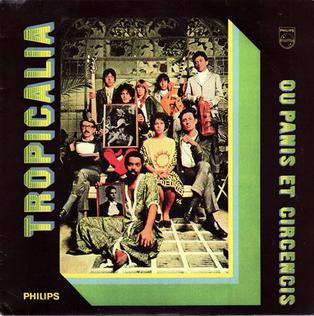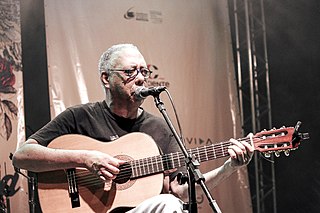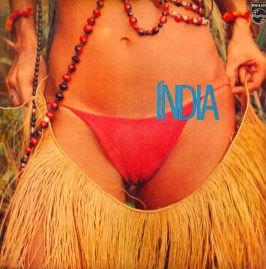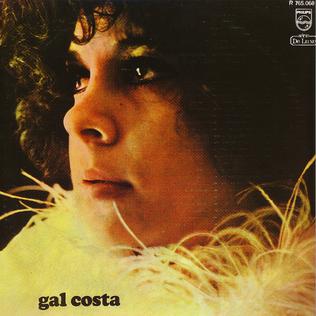
Eduardo de Góes "Edu" Lobo is a Brazilian singer, guitarist, and composer.

Raul Santos Seixas was a Brazilian rock musician foundational to the genre. Rolling Stone Brazil named Seixas among the greatest artists in Brazilian music.

Gal Maria da Graça Costa Penna Burgos, known professionally as Gal Costa ( ), was a Brazilian singer of popular music. She was one of the main figures of the tropicalia music scene in Brazil in the late 1960s and appeared on the acclaimed compilation Tropicália: ou Panis et Circencis (1968). She was described by The New York Times as "one of Brazil's greatest singers."

Antônio Maurício Horta de Melo is a Brazilian jazz guitarist and vocalist.

Luiz Carlos dos Santos, widely known by his stage name Luiz Melodia, was a Brazilian singer-songwriter whose music was a characteristic crossover of multiple Music genres including Música popular brasileira (MPB), rock music, blues, soul music and samba. He has been described as 'one of the most important Brazilian-born musicians.'

Tropicália ou Panis et Circencis is a 1968 collaboration album by artists including Gilberto Gil, Caetano Veloso, Tom Zé, Nara Leão, Os Mutantes and Gal Costa. Considered an important record in the Tropicália movement and in the history of Brazilian music, it features orchestral arrangements by Rogerio Duprat and lyrical contributions from Torquato Neto.

Caetano Veloso is the third self-titled album by Caetano Veloso. It was recorded in England, when the artist was in an exile imposed by the Brazilian military dictatorship for being subversive. It is mostly sung in English and portrays a sad tone throughout, reflecting his feelings about homesickness and the absence of his family and friends. It was released first in Europe, and then in Brazil, in 1971.

João Donato de Oliveira Neto was a Brazilian jazz and bossa nova pianist as well as a trombonist from Rio Branco. He first worked with Altamiro Carrilho and went on to perform with Antonio Carlos Jobim and Astrud Gilberto. Because of the area he grew up in Brasil he was able to hear Cuban music on the radio. This influence would manifest itself in many of his compositions, piano, and trombone playing. Donato's most well-known compositions include: "Amazonas", "Lugar Comum", "Simples Carinho", "Até Quem Sabe" and "Nasci Para Bailar".

Yvonne Lara da Costa OMC, better known as Dona Ivone Lara, was a Brazilian singer and composer. Known as the Queen of Samba and Great Lady of Samba, she was the first woman to sign a samba-enredo and take part in a wing of composers in the school, Império Serrano.

Doces Bárbaros is a 1976 album by the Música popular brasileira supergroup of the same name. It was recorded June 24 of that year at Anhembi Stadium in São Paulo. Its members were Gilberto Gil, Caetano Veloso, Maria Bethânia and Gal Costa, four of the biggest names in the history of the music of Brazil. The band was the subject of a 1977 documentary directed by Jom Tob Azulay. In 1994, they performed a tribute concert to Mangueira school of samba.
"Eu Sei Que Vou Te Amar" is a bossa nova jazz standard composed by Antônio Carlos Jobim and Vinícius de Moraes. The first recording was by the Brazilian singer Maysa, appeared on her 33 rpm LP, RGE - XRLP 5068, published in 1959. Another version was the 13th track on Vinícius de Moraes's 1970 album En 'la Fusa' con Maria Creuza y Toquinho.

Jards Anet da Silva, known as Macalé, is a Brazilian composer, singer and actor, known for his influential role in Brazil's tropicália movement in the 1960s.

Índia is the fourth studio album by Brazilian singer Gal Costa, released on 1973 by Philips Records. Its major hits were "Índia", "Volta" and "Desafinado".

Gal Costa is the first solo album by the Brazilian singer Gal Costa, released in 1969. It was ranked the 80th best Brazilian album of all time by the Brazilian Rolling Stone magazine.

Gal or Gal Costa is the second album by Brazilian singer Gal Costa, released months after the first album Gal Costa. To distinguish it from Costa's previous release, the album is sometimes referred to as Cinema Olympia, the title of its first track. It is considered by the public and critics alike as her most psychedelic and experimental album. The music in the album has been considered unprecedented. Andy Beta of The Pitchfork Review described the album as "the equivalent of Barbra Streisand recording with Boredoms" and "one of the heaviest documents of Tropicália."

-Fa-Tal- Gal a Todo Vapor is the first live album by Brazilian singer Gal Costa, released in 1971. It was ranked the 20th best Brazilian album of all time by the Brazilian Rolling Stone magazine.
The cantar is a form of classical Spanish canción, song or poem.

Renato Teixeira de Oliveira is a Brazilian singer-songwriter. He is a representative of sertanejo music and folk rock, linked to the caipira culture and dialect. Teixeira is the author of several hit songs including "Romaria", which was notably covered by Elis Regina in her eponymous 1977 album. Other hit songs by Teixeira were "Dadá Maria" and "Tocando em Frente", later sung also by Maria Bethânia. Teixeira won twice the Latin Grammy Award: in 2015 for Best Sertaneja Music Album, with Sérgio Reis, and in 2016, with Sater. His album +AR was ranked as the 44th best Brazilian album of 2018 by the Brazilian edition of Rolling Stone magazine and among the 25 best Brazilian albums of the second half of 2018 by the São Paulo Association of Art Critics.

Thalma de Freitas is a Brazilian actress, singer and composer.
















